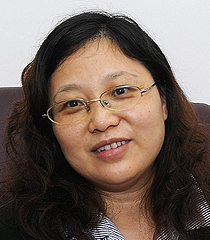|
Amid the global financial crisis, strategies for going global and introducing Foreign Direct Investment (FDI) to Chinese enterprises so as to promote Sino-African bilateral trade and investment are of equal importance. That's the opinion of Yang Shaojing, Vice Director with Council Affairs Department of the 13th China International Fair for Investment and Trade (CIFIT), which takes place September 8-11 in Xiamen, China. She spoke to ChinAfrica correspondent Dai Xiaohua about how the fair is relevant in today's economic climate. Excerpts follow:
ChinAfrica: How many exhibitors will attend this year's CIFIT? In which sectors are the African countries and organizations mostly involved?

Yang ShaojingA: Since international exchange and cooperation have become a common channel for almost all countries to dillute the impact the global economic crisis, the coming fair has aroused great interest and enthusiasm among overseas exhibitors including international economic organizations, chambers of commerce and enterprises. As a result, we have to enlarge the floor space of the overseas exhibition hall. So far, a total of 58 exhibitors have signed up for the fair. The number is expected to reach 80, with 500 entities to participate.
It is encouraging to see that dozens of African countries has reserved booths and will send over 10 delegations, including those from the South African Department of Trade and Industry, the Kenyan Investment Authority, the Tanzanian Board of External Trade, the Egyptian Board of Investment and Liberalization. Rwanda will also send over a government delegation.
South Africa alone has booked a 502-square-meter floor space and will host a special event during the fair to publicize its investment opportunities and present its overall busiess climate. Its minister of trade and industry will bring with him 50 entrepreneurs to attend the event.
Zambia and Tanzania have also booked 10 and 2 booths respectively, with the former planning to present a picture of its handicraft and trade industries and the latter to promote its overall national image.
Tourism, handicraft and mining would be top stories to be told by the African countries in the fair.
What role does CIFIT play in Sino-Africa economic and trade exchanges?
The establishment of diplomatic relations with Egypt in 1956 began a new era in Sino-African relations.
As the only investment promotion event in China designed to promote two-way international investment and the largest global investment promotion fair, CIFIT is designed as a platfom for cooperation between Chinese and overseas investors and a channel for African businesses to seek partnership in bilateral and multilateral cross-border investment.
During the fair, South Africa, Rwanda, Mauritius and Senegal will all host special sessions to interpret their policies on foreign direct investment, describe their investment climate, and offer investment opportunities. In this sense, CIFIT acts as a bridge, a coordinator and an interpreter committed to promotion of long-term relationship and immediate cooperation between China and African countries.
Compared with the China Import and Export Fair (Canton Fair), what are the main features of CIFIT? What are the differences between the two fairs in promoting Sino-African economic and trade development? What does CIFIT mean for the bilateral trade relations?
They are different. CIFIT focuses on international investment promotion while Canton Fair, held twice a year, aims at export and import business.
Exhibitors of CIFIT comprise of governmental-level investment divisions, investment companies, and international organizations. It features investment and trade exhibitions, investment forums and seminars on hot issues, and investment matchmaking symposia. The Canton Fair, on the other hand, serve mainly business people engaged in the export-oriented sector with buyers from home and aboard.
The CIFIT and the Canton Fair are of equal importance to Africa in terms of economic and trade development.
What should be pointed out here is the constant growth of the size and elevation of the scale of CIFIT. Starting from the 5th CIFIT, for instance, the fair has got a new role -- serving as the media for implementation of China's 'go out' strategy. Apart from promoting investment at home, as it used to to, the fair has been transformed into a bridge approach ushering in inbound capital and directing outbound investment.
So far as Sino-African economic and trade cooperation is concerned, which should come first, ODI or FDI? Why?
They are of equal importance, as I see. Both sides are making efforts to bring bilateral economic and trade relationships to new heights on a larger scale to jointly cope with the global financial crisis.
| 